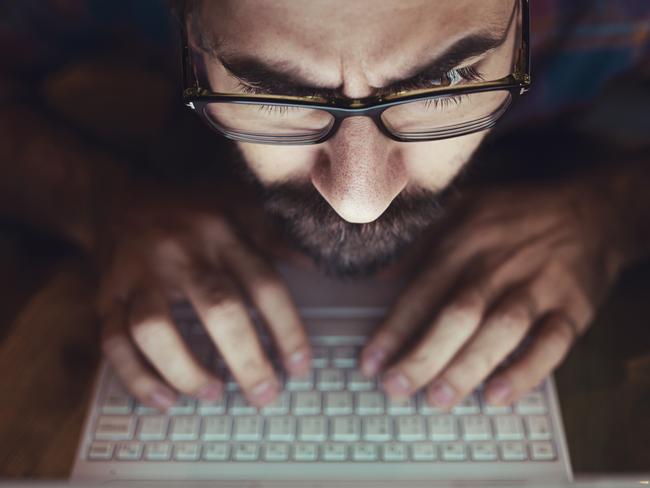How to work from home effectively during the coronavirus pandemic
As Australian offices continue to shut down amid the coronavirus pandemic, experts say there are simple ways to create the ultimate home workspace.
At Work
Don't miss out on the headlines from At Work. Followed categories will be added to My News.
More Australians are working from home each day as employers rush to protect their staff and business from COVID-19.
Telstra, Vodafone, Westpac, Ernst and Young, Atlassian and News Corp are among the growing list of companies asking staff to work remotely in a bid to stop the virus spreading.
For many people, this is their first experience working unsupervised and relying on their own set up and technology.
Experts share their advice for working effectively from home.
TREAT IT LIKE A LONG-DISTANCE RELATIONSHIP
Corporate psychologist and chief executive and co-founder of software company Shortlyster Rudy Crous said working from home was like having a long distance relationship with your employer.
“Upfront it is important that you have a clear understanding of what the working hours are and what is expected from you during this time,” he said.
“You need to be much more transparent than usual and make sure you set up regular calls to provide updates to your employer (that) include what you are working on, any barriers you are currently facing, and what support you need from your boss/colleagues.”
Mr Crous said workers might feel as though they were over-communicating in the beginning but it was about setting short-term goals and establishing clear weekly deliverables.
CREATE A DEDICATED WORKSPACE AND SCHEDULE
Mr Crous said workers needed a space without distractions.
“For example, remove all non-work items and devices from this workspace,” he said.
“Once you have this, develop a daily work plan that includes writing a to-do list and a strict schedule on when you will be working or taking breaks.
“It’s important to make a clear separation between work and personal life.
“Plan for personal activities around your work arrangement and expectation of working hours.”

GET COMFORTABLE WITH VIDEO CALLS
It might be tempting for people to work in their pyjamas, but there is a good chance teams will be embracing video calls if they are working remotely.
The Agile Eleven head of experience Martine Sholl said people felt more connected when they could see each other and their expressions.
“I think (video) is incredibly important – there is a different connectivity between text or emails and face-to-face communication,” she said.
“A phone call is the next best thing.”

She said video was not just useful for meetings either.
It could be used for team building exercises, such as virtual exercise classes, or for general socialising with colleagues, such as virtual coffee catch-ups.
The Agile Eleven, itself a business consultancy made up of 15 remote workers, is offering free Remote Ready Webinars to help businesses cope with the disruption of the COVID-19 outbreak.
MORE NEWS:
Home office tech is ‘the new loo paper’
How to self-isolate the right way
Dealers slash prices of new cars
Online shoppers warned of delays due to virus
KEEP YOUR MORNING RITUAL
Ms Sholl said the transition to remote work would be made easier by not breaking with old habits.
“If you exercise and have breakfast before you go to your office, still do that before you go to your workspace at home,” she said.
“Still have that feeling of going to work.”
Workers should also stick to rituals of taking breaks and switching off after hours.
“We want to be able to work effectively and breaks are important,” she said.
“We live in a world where our phones are attached to our hand so it’s easy to check email (but) there is a need for an element of discipline around it.”
CORONAVIRUS IS NOT THE ONLY VIRUS TO AVOID
KnowBe4 APAC security awareness advocate Jacqueline Jayne said businesses were potentially more vulnerable to cybersecurity threats when employees transitioned to remote work without much preparation.
“We have seen an influx of phishing emails designed to entrap users to click on a link or open a PDF which will unleash malicious software (malware),” she said.
“The very nature of COVID-19 causes fear and panic in many and hackers use this to their advantage.
“There are reported cases of emails supposedly from the CDC and the World Health Organisation and hackers are finding ways to exploit everything about the situation.”

Ms Jayne had these tips for employees:
1. Be on the lookout for emails or text messages related to COVID-19 and confirm the information directly with the vendor, bank or your boss
2. If you will be using shared equipment that your family also uses at home, ensure the latest security updates are installed
3. Conduct a security scan on any shared equipment to make sure there is no malware or other malicious objects infecting the machine
4. Be cautious of any unexpected emails containing links or attachments
5. Ensure Wi-Fi connections are password protected. Alternatively, use a VPN to get online.
6. Use complex passwords or a password manager to store all passwords securely
Originally published as How to work from home effectively during the coronavirus pandemic
